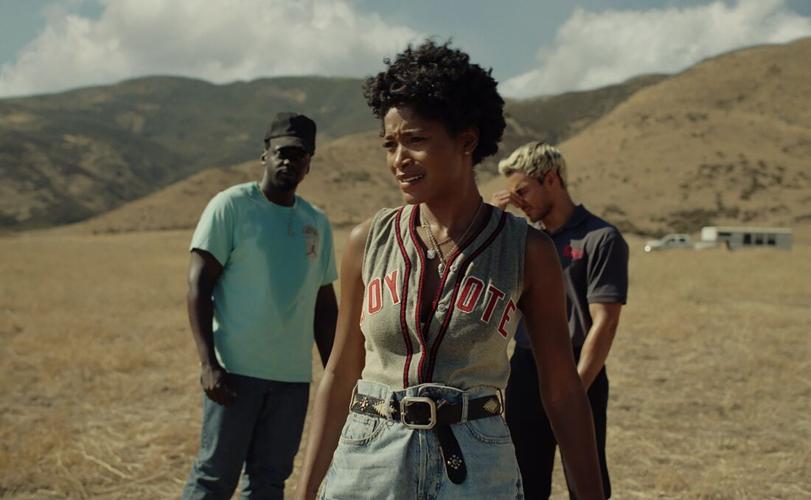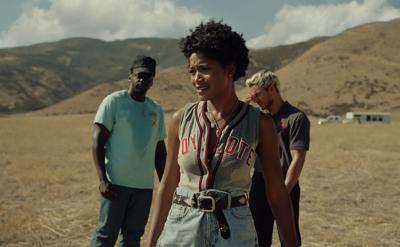Jordan Peele occupies an increasingly narrow space in film. He writes, directs and produces midbudget movies from completely original ideas — and he makes money doing it. A known quantity now thanks to the critical and commercial success of his 2017 directorial debut Get Out and 2019 follow-up Us, the onetime sketch comedian returns this week with Nope, a sci-fi/horror effort that not only lives up to its potential, but is relentlessly original.
After the sudden death of their father (the always magnificent Keith David) due to an apparent freak accident, siblings OJ (Daniel Kaluuya) and Emerald (Keke Palmer) inherit the old man’s ranch, where they train and care for motion-picture horses. Descendants of the Black jockey featured in Eadweard Muybridge’s The Horse in Motion — the first moving pictures ever recorded — the Haywood siblings soon discover that a sinister force, one perhaps not of planet Earth, is looming over their longtime family ranch. Along for the ride are paranormal-activity-obsessed tech whiz Angel (Brandon Perea), comically cryptic cinematographer Antlers Holst (Michael Wincott) and former child star Ricky “Jupe” Park (Steven Yeun), who runs a neighboring theme park and whose backstory subplot involves a chimpanzee rampage that does a lot of the film’s subtextual heavy lifting.
As the hardworking, unfortunately named OJ, Kaluuya broods and smolders. As his gregarious sister, Palmer is electric, a nonstop delight to watch. They and the rest of the cast do the important work of endearing us to these characters — so that no matter how outlandish Nope’s premise may ultimately prove to be, we’re invested. (And for what it’s worth, this premise is nowhere near as far-fetched as that of Us, a movie with no shortage of Peele’s trademark striking imagery but nowhere near as airtight or excellent as Get Out.)
I’m far from the first critic to draw comparisons between Peele and M. Night Shyamalan, a director who exhibited similar promise, influences and thematic interests early in his filmmaking career. Indeed, Peele himself has acknowledged Shyamalan’s Signs — one of that filmmaker’s best — as a direct influence on Nope. But where Shyamalan’s characters are so often two-dimensional avatars designed to carry out a plot, Peele’s are self-aware, complicated and funny — and they speak and behave like normal people, which is a nut Shyamalan could never quite crack.

Nope
But really, this film is more Jaws than Signs — a high-stakes thriller with a tight narrative and a small central cast. As with any good sci-fi, Nope is allegorical. As with any good horror, it teases out our expectations and toys with us using a tasteful amount of misdirection and jump-scares. Sure, it’s a movie about a spooky, otherworldly thing come to terrorize some likeable rural Southern Californians. But it’s also a film about race, legacy, emotional trauma, grief and obsession.
Peele has a knack for conceiving and executing shots that are so compelling, so memorable, that I sometimes wonder if he dreams up these images first, later reverse-engineering plot points to get us there. A blood-covered chimp extending its paw for a fist-bump. Steven Yeun looking skyward as his cowboy hat is blown off by some supernatural force. A string of colorful plastic pennants dancing in the wind, seemingly affixed to a low-hanging cloud. These moments look incredible on the big screen, and thankfully, Peele is a strong enough storyteller to make them all work.
Nope stands alongside Daniels’ Everything Everywhere All at Once as a 2022 movie that — without the help of multibillion-dollar IP — dares to be outlandish, dazzles with its imagery and makes the most of its small, exceptional cast. Though fewer and further between, it's a blessing that we still have filmmakers like Peele taking chances within the studio system. Nope delivers.







